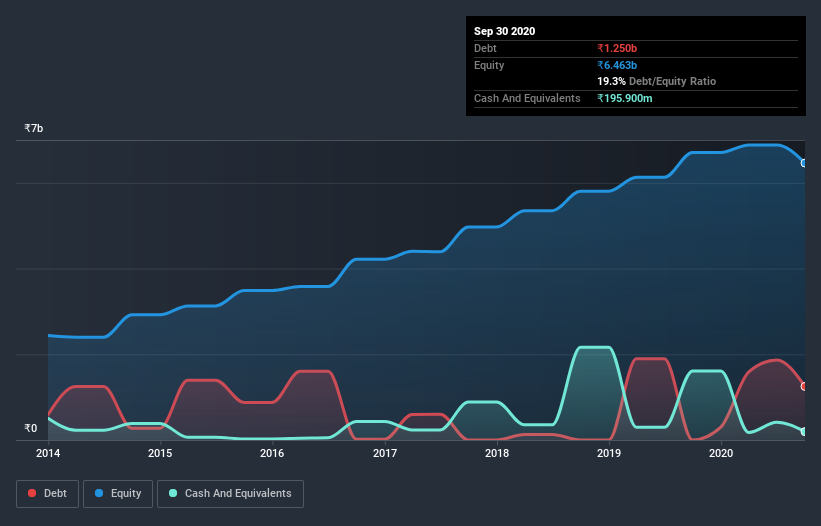- India
- /
- Consumer Durables
- /
- NSEI:JCHAC
We Think Johnson Controls-Hitachi Air Conditioning India (NSE:JCHAC) Has A Fair Chunk Of Debt
Howard Marks put it nicely when he said that, rather than worrying about share price volatility, 'The possibility of permanent loss is the risk I worry about... and every practical investor I know worries about.' When we think about how risky a company is, we always like to look at its use of debt, since debt overload can lead to ruin. Importantly, Johnson Controls-Hitachi Air Conditioning India Limited (NSE:JCHAC) does carry debt. But should shareholders be worried about its use of debt?
What Risk Does Debt Bring?
Debt is a tool to help businesses grow, but if a business is incapable of paying off its lenders, then it exists at their mercy. If things get really bad, the lenders can take control of the business. However, a more common (but still painful) scenario is that it has to raise new equity capital at a low price, thus permanently diluting shareholders. Of course, debt can be an important tool in businesses, particularly capital heavy businesses. When we examine debt levels, we first consider both cash and debt levels, together.
Check out our latest analysis for Johnson Controls-Hitachi Air Conditioning India
What Is Johnson Controls-Hitachi Air Conditioning India's Debt?
The image below, which you can click on for greater detail, shows that at September 2020 Johnson Controls-Hitachi Air Conditioning India had debt of ₹1.25b, up from none in one year. However, it also had ₹195.9m in cash, and so its net debt is ₹1.05b.

A Look At Johnson Controls-Hitachi Air Conditioning India's Liabilities
We can see from the most recent balance sheet that Johnson Controls-Hitachi Air Conditioning India had liabilities of ₹4.47b falling due within a year, and liabilities of ₹1.19b due beyond that. Offsetting these obligations, it had cash of ₹195.9m as well as receivables valued at ₹1.30b due within 12 months. So its liabilities outweigh the sum of its cash and (near-term) receivables by ₹4.16b.
Of course, Johnson Controls-Hitachi Air Conditioning India has a market capitalization of ₹62.1b, so these liabilities are probably manageable. However, we do think it is worth keeping an eye on its balance sheet strength, as it may change over time. The balance sheet is clearly the area to focus on when you are analysing debt. But you can't view debt in total isolation; since Johnson Controls-Hitachi Air Conditioning India will need earnings to service that debt. So if you're keen to discover more about its earnings, it might be worth checking out this graph of its long term earnings trend.
In the last year Johnson Controls-Hitachi Air Conditioning India had a loss before interest and tax, and actually shrunk its revenue by 40%, to ₹14b. To be frank that doesn't bode well.
Caveat Emptor
Not only did Johnson Controls-Hitachi Air Conditioning India's revenue slip over the last twelve months, but it also produced negative earnings before interest and tax (EBIT). Indeed, it lost ₹141m at the EBIT level. When we look at that and recall the liabilities on its balance sheet, relative to cash, it seems unwise to us for the company to have any debt. So we think its balance sheet is a little strained, though not beyond repair. However, it doesn't help that it burned through ₹2.2b of cash over the last year. So suffice it to say we do consider the stock to be risky. When analysing debt levels, the balance sheet is the obvious place to start. However, not all investment risk resides within the balance sheet - far from it. For example, we've discovered 1 warning sign for Johnson Controls-Hitachi Air Conditioning India that you should be aware of before investing here.
If you're interested in investing in businesses that can grow profits without the burden of debt, then check out this free list of growing businesses that have net cash on the balance sheet.
When trading Johnson Controls-Hitachi Air Conditioning India or any other investment, use the platform considered by many to be the Professional's Gateway to the Worlds Market, Interactive Brokers. You get the lowest-cost* trading on stocks, options, futures, forex, bonds and funds worldwide from a single integrated account. Promoted
New: Manage All Your Stock Portfolios in One Place
We've created the ultimate portfolio companion for stock investors, and it's free.
• Connect an unlimited number of Portfolios and see your total in one currency
• Be alerted to new Warning Signs or Risks via email or mobile
• Track the Fair Value of your stocks
This article by Simply Wall St is general in nature. It does not constitute a recommendation to buy or sell any stock, and does not take account of your objectives, or your financial situation. We aim to bring you long-term focused analysis driven by fundamental data. Note that our analysis may not factor in the latest price-sensitive company announcements or qualitative material. Simply Wall St has no position in any stocks mentioned.
*Interactive Brokers Rated Lowest Cost Broker by StockBrokers.com Annual Online Review 2020
Have feedback on this article? Concerned about the content? Get in touch with us directly. Alternatively, email editorial-team@simplywallst.com.
About NSEI:JCHAC
Johnson Controls-Hitachi Air Conditioning India
Manufactures and distributes air conditioners, chillers, refrigerators, air purifiers, and variable refrigerant flow systems in India and internationally.
Flawless balance sheet with solid track record and pays a dividend.
Similar Companies
Market Insights
Community Narratives



